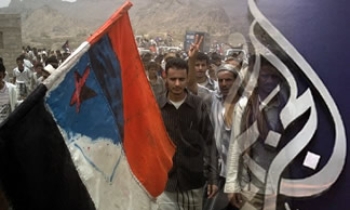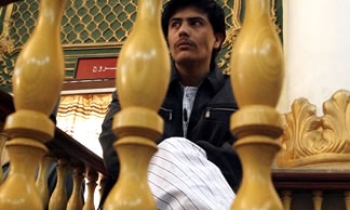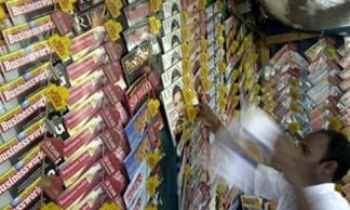The International News Safety Institute (INSI) has pleaded with journalists to resist calls to carry guns in Iraq following the gruesome murders of three more news staff. The Iraq correspondent for Al Arabiya, Atwar Bahjat, cameraman Khaled Mahmoud Al Falahi and technician Adnan Khairallah were shot by unidentified gunmen near Samarra on February 23 as they covered the attack on the holy sites in the city.
 KILLED FOR HER WORK: A TV grab taken off the Dubai-based Al Arabiya satellite news channel shows its reporter in Baghdad, Iraqi journalist Atwar Bahjat al-Samerai who was assassinated in Samarra on 22 February, transmitting her last report from an open field on the fringes of the central Iraqi city after sunset yesterday. Bahjt and her two crewmen were kidnapped and killed on the outskirts of Samarra, north of Baghdad. (AFP/Al-Arabiya)
KILLED FOR HER WORK: A TV grab taken off the Dubai-based Al Arabiya satellite news channel shows its reporter in Baghdad, Iraqi journalist Atwar Bahjat al-Samerai who was assassinated in Samarra on 22 February, transmitting her last report from an open field on the fringes of the central Iraqi city after sunset yesterday. Bahjt and her two crewmen were kidnapped and killed on the outskirts of Samarra, north of Baghdad. (AFP/Al-Arabiya)At a news conference after the killings, a reporter asked President Jalal Talabani to allow journalists to carry weapons to defend themselves. "Send me an official request and I will approve it and inform concerned agencies to give you the right to carry arms," he replied. INSI believes that the safety of journalists would not be improved, and in fact probably would be diminished, were they to carry weapons, the institute said.
"Journalists increasingly are being targeted in conflict largely because they have lost, in the eyes of certain elements, their status as neutral observers. If they bear arms they reinforce this misguided belief by placing themselves on one side or another," said INSI Director Rodney Pinder.
"A journalist with a gun says some people in the situation I'm covering are my enemies and I am prepared to kill them if necessary. That is not the position of a neutral civilian," Pinder said. Most importantly, journalists who carry arms may remove themselves from the protection, flimsy though it is, afforded to civilians in war by the Geneva Conventions.
Article 79 of the 1977 Additional Protocol to the Geneva Conventions says: "Journalists engaged in dangerous professional missions in areas of armed conflicts shall be considered as civilians... They shall be protected as such under the Conventions and this Protocol, provided they take no action adversely affecting their status as civilians..."
Wadah Khanfar, Managing Director of Al Jazeera, where Bahjat worked before moving over to Al Arabiya, said, "Journalists from all nations are increasingly being targeted in conflict zones and journalists like Atwar have to walk a fine line in presenting the truth while understanding the sometimes dangerous consequences they face."
"Atwar is sadly the latest in a series of killings of journalists in Iraq. If a balanced journalist like Atwar could be killed while practising her profession, we have to ask what has become of journalism in Iraq. More measures need to be in place to protect journalists from across the world," Khanfar said.
 DEATHTRAP Iraq: An Iraqi policeman inspects the body of Al Arabiya's Atwar Bahjat and two colleagues, found near Samarra, 95 kilometres (60 miles) north of Baghdad, February 23. The International News Safety Institute (INSI) has pleaded with journalists to resist calls to carry guns in Iraq following the gruesome murders of three more news staff. (AP Photo/Hameed Rasheed)
DEATHTRAP Iraq: An Iraqi policeman inspects the body of Al Arabiya's Atwar Bahjat and two colleagues, found near Samarra, 95 kilometres (60 miles) north of Baghdad, February 23. The International News Safety Institute (INSI) has pleaded with journalists to resist calls to carry guns in Iraq following the gruesome murders of three more news staff. (AP Photo/Hameed Rasheed)According to International Federation of Journalists (IFJ), 109 journalists and media staff have been killed in the country since the 2003 invasion. The Committee to Protect Journalists (CPJ) has put the toll at 64 journalists and 23 media workers. Reporters sans Frontières (RSF), however, said 82 journalists and media assistants have been killed since the start of the war in Iraq. Seven of them have died since January 1, 2006, making this start of the year the most deadly in three years. Atwar Bahjat is the 7th woman journalist to be killed since the war in Iraq began.
According to RSF, thirtyeight journalists and media assistants have been kidnapped since the March 2003 start of the war in Iraq. Five of them were killed by their kidnappers (four Iraqis and the Italian Enzo Baldoni). The others have been released safe and well. Twenty-three of the kidnappings took place in Baghdad or its suburbs. Local TV al-Iraqiya is the Iraqi media that has been worst hit during the war with ten journalists and media assistants murdered.
INSI and other organisations concerned with the safety of journalists in conflict believe that the bearing of arms would amount to that action. "It is entirely understandable that journalists in Iraq, who have suffered so much, are contemplating extreme measures to protect themselves, and we sympathise with them in their plight," Pinder said. "But we must be very careful to avoid any action that might make a bad situation even worse both for individuals and the Iraq news community as a whole."
The INSI director said: "We mourn the brutal and cowardly murders of these brave Al Arabiya reporters who were only trying to do their job. Those who attack journalists in Iraq would do well to remember that were it not for Atwar, Khaled and Adnan and dozens of journalists like them, the world would not know of the outrages at the holy sites in Samarra or of the other sufferings of the Iraqi people. Journalists and their support staff must be protected and defended by the societies that need them."









